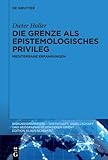Die Grenze als epistemologisches Privileg : Mediterrane Erfahrungen / Dieter Haller.
Material type: TextSeries: Diskussionspapiere : Wirtschaft, Gesellschaft und Geographie im Vorderen OrientPublisher: Berlin ; Boston : De Gruyter, [2021]Copyright date: ©2021Description: 1 online resource (V, 49 p.)Content type:
TextSeries: Diskussionspapiere : Wirtschaft, Gesellschaft und Geographie im Vorderen OrientPublisher: Berlin ; Boston : De Gruyter, [2021]Copyright date: ©2021Description: 1 online resource (V, 49 p.)Content type: - 9783110749281
- 9783110749335
- 9783110749311
- 306.4/2 23/eng/20221129
- BD175 .H35 2021
- online - DeGruyter
- Issued also in print.
| Item type | Current library | Call number | URL | Status | Notes | Barcode | |
|---|---|---|---|---|---|---|---|
 eBook
eBook
|
Biblioteca "Angelicum" Pont. Univ. S.Tommaso d'Aquino Nuvola online | online - DeGruyter (Browse shelf(Opens below)) | Online access | Not for loan (Accesso limitato) | Accesso per gli utenti autorizzati / Access for authorized users | (dgr)9783110749311 |
Browsing Biblioteca "Angelicum" Pont. Univ. S.Tommaso d'Aquino shelves, Shelving location: Nuvola online Close shelf browser (Hides shelf browser)
Frontmatter -- Inhalt -- Praxis oder Raum: Wider das allfällige Identitäterä -- Moderne? Was ist das? -- Im Wesentlichen westlich? -- Lineare Grenzen -- Ethnologische Grenzforschung -- Das Leben selbst – ein Grenzgang? -- Grenzen als privilegierte Orte der Erkenntnis -- Grenzen des Menschseins: Einverleibung und Anverwandlung des Fremden -- Transgressionen – temporäre und dauerhafte -- Fazit -- Literatur
restricted access online access with authorization star
http://purl.org/coar/access_right/c_16ec
Die meisten Sozial- und Geisteswissenschaften kennzeichnen sich durch das Bemühen darum, die Welt mit klaren Kategorien zu erkennen. Diesem unterliegt die Vorstellung der linearen Grenze. Unter Rückgriff auf Befunde aus dem nordafrikanischen und europäischen Mittelmeerraum kontextualisiert der vorliegende Artikel mit ethnologischem Blick das Gedankenmodell der Linearität historisch, politisch und kulturell, indem er dieses mit Grenzen als Zonen des Überganges kontrastiert und nach dem epistemologischen Gewinn fragt, der sich daraus für die Disziplinen entfaltet.
Most disciplines in the social sciences and humanities attempt to identify the world using clear categories. This process is based on the idea of linear borders. Using the example of the Mediterranean Sea, this volume places the thought model of linearity within its historical, political, and cultural context by taking an ethnological perspective and contrasting it with the idea of borders as zones of transition.
Issued also in print.
Mode of access: Internet via World Wide Web.
In German.
Description based on online resource; title from PDF title page (publisher's Web site, viewed 01. Dez 2022)









